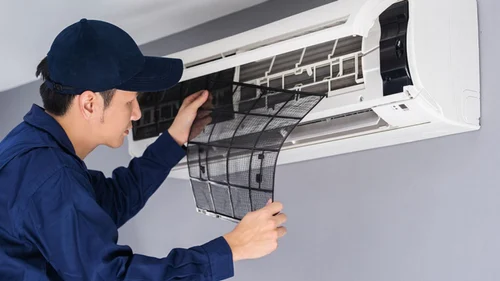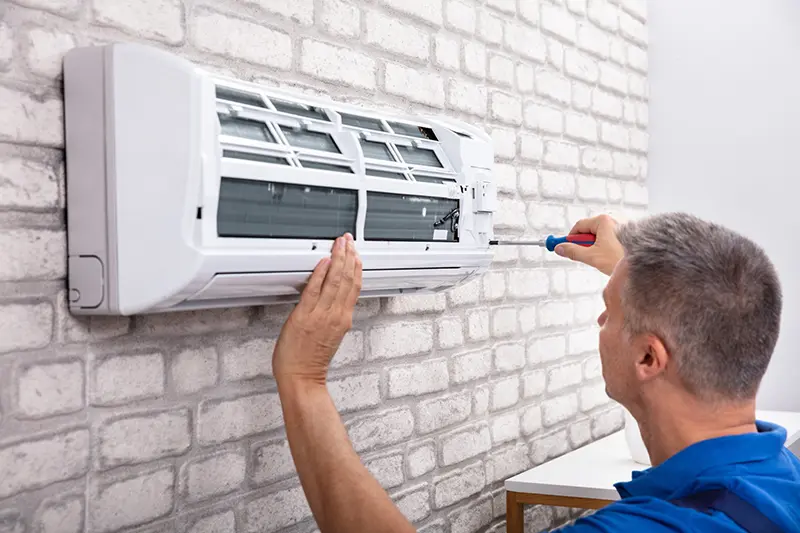Indicators on Ac Repair You Need To Know
Indicators on Ac Repair You Need To Know
Blog Article
An Unbiased View of Ac Fixing
Air conditioning Repair Near Me: Expert Cooling System Repair Ensures Your Home Stays Comfy Throughout The Year
Types of Air Conditioning Systems
When taking on air conditioning repair work, understanding the type of a/c system you're dealing with can save time, cash, and irritation. Ever wondered why some systems cool a room quicker than others? Or why certain systems seem to break down more often? Let's peel back the layers.
Central Air Conditioning
Rumored Buzz on Air Conditioning Repair
Think of a cool breeze streaming through an entire home, whispering comfort into every corner. Central air conditioning systems do precisely that. They use a network of ducts to disperse cooled air, depending on a compressor and condenser outside, matched with an evaporator coil inside. When this complex monster falters, pinpointing the issue can be like discovering a needle in a haystack.
Split Systems

Split systems are a popular choice for many homes-- part indoor unit, part outside compressor. They offer versatility and effectiveness, however their dual nature means repair work can involve either element. Have you ever heard an unusual noise outside your home only to discover the indoor unit isn't cooling? That's a traditional indication of a split system glitch.
The 15-Second Trick For Air Conditioning Repair Near Me
Window Units
These compact warriors fight summertime heat by fitting comfortably into a window frame. They combine all elements into a single box. Their simpleness typically suggests less repair headaches, however overlooking filters or permitting debris accumulation can result in check here reduced efficiency or breakdowns.
Ductless Mini-Splits
About Fix Air Conditioner
Ductless systems bypass ductwork totally, making them perfect for homes without existing ventilation. They're quiet, efficient, and surprisingly durable. Yet, when repair work are required, specialists should be skilled at managing refrigerant lines and electrical connections-- no small task.
Quick Reference Table
| Type | Key Features | Common Repair Issues |
|---|---|---|
| Central air conditioning | Ductwork, whole-house cooling | Duct leaks, compressor failure |
| Split System | Indoor & & outside units | Refrigerant leaks, fan motor issues |
| Window Unit | All-in-one, simple installation | Filthy filters, electrical faults |
| Ductless Mini-Split | No ducts, zoned cooling | Line leaks, sensor breakdowns |
Ac Repair Near Me Fundamentals Explained
Unwinding the Many Frequent AC Problems
Have you ever wondered why your air conditioning unit suddenly stops cooling during a sweltering afternoon? One common culprit is a dirty or stopped up air filter. This sly villain limits airflow, forcing your system to work overtime, which not just decreases effectiveness but can likewise lead to premature breakdowns. Envision trying to breathe through a headscarf taken in dust-- it's exhausting!
Another regular hiccup is refrigerant leaks. These invisible leakages don't simply reduce cooling power but can also harm the compressor, the heart of your a/c system. How typically do you look for uncommon hissing sounds or ice formation on the coils? Catching these indications early can conserve you from pricey repair work down the line.
Beyond the Fundamentals: Lesser-Known Issues
The Ac Repair Ideas
Sometimes, the thermostat itself is the mischief-maker. Miscalibrated or faulty thermostats send out mixed signals, causing the air conditioner to cycle unpredictably. Ever experienced your air conditioner turning on and off in quick succession? That's called short cycling, a tricky performance drainer that can wear elements faster than you 'd expect.
Electrical problems, such as worn electrical wiring or a malfunctioning capacitor, may hide beneath the surface area. Repair Air Conditioner Near Me. These often manifest as AC units failing to begin or all of a sudden closing down. An expert eye understands to test these elements with precision tools, something a casual look will not expose
Specialist Tips for Diagnosing Common A/c Problems
Fascination About Ac Repair Near Me
- Inspect and change air filters frequently-- every 1 to 3 months depending upon use and environment.
- Listen for uncommon noises like rattling or buzzing that could signify loose parts or electrical faults.
- Examine the outside system for debris or blockages that impede airflow and trigger getting too hot.
- Look for frost accumulation on evaporator coils, a hint towards refrigerant problems or air flow limitations.
- Check the thermostat settings and recalibrate if the temperature readings feel off.
Quick Referral Table: Manifestation & & Probable Causes

| Symptom | Probable Cause | Expert Pointer |
|---|---|---|
| Warm air blowing | Low refrigerant or unclean coils | Tidy coils and examine for leaks right away |
| Brief cycling | Thermostat concerns or oversized system | Change thermostat settings and seek advice from sizing standards |
| Unit won't start | Electrical faults or capacitor failure | Test electrical wiring and change capacitors as needed |
| Water leakage | Blocked drain line or frozen evaporator | Clear drain lines and inspect for coil icing |
DIY Air Conditioning Upkeep Tips
7 Simple Techniques For Ac Air Conditioner Repair
Ever seen your air conditioning system sputtering like an old engine on a hot summertime day? Neglecting subtle signs frequently indicates more than simply a sweaty afternoon-- it's a prelude to unanticipated a/c repair expenses. But what if you could catch those whispers before they turn into wails? Regular DIY upkeep can be your first line of defense.
Simple Actions to Keep Your Air Conditioning Running Smoothly
Little Known Questions About Air Conditioning Repair Near Me.
- Clean or Replace Filters: A stopped up filter resembles trying to breathe through a headscarf. Every 1-3 months, examine and swap out your filters. It improves air flow and efficiency, avoiding compressor stress.
- Examine the Condenser Coils: Dust and debris act as unnoticeable blankets smothering your system's cooling power. Carefully brush or vacuum the coils, but prevent severe chemicals that may erode the metal.
- Inspect the Drain Line: When was the last time you glanced at your drain pan? A blocked drain can trigger water leaks and foster mold growth. Flushing it with a vinegar option monthly keeps the circulation clear.
- Seal and Insulate: Are your ductworks whispering leakages? Sealing spaces with mastic or foil tape increases performance and minimize uneven cooling.
Pro Tips Beyond the Basics
- Step your unit's voltage to catch subtle electrical wear before it stimulates big problems.
- Listen for unusual hums or rattles-- these acoustic breadcrumbs frequently signal loose parts or stopping working motors.
- Keep outdoor units shaded however guarantee a minimum of 2 feet of clearance around them for optimum airflow.
Ask yourself: Are you hearing your AC's quiet SOS or just awaiting it to shout? Taking time for DIY a/c upkeep transforms reactive repair work into proactive care, saving sweat, stress, and yes, money.
Air Conditioning Repair Near Me Things To Know Before You Buy
Why Knowledge in Air Conditioner Repair Work Matters
Imagine this: your a/c unit sputters and groans throughout a scorching afternoon, leaving you sweltering inside. Would you trust a newbie fumbling with fragile parts, or would you look for the reassurance of a expert air conditioner specialist!.?.!? The intricacies of modern-day a/c systems require accuracy and experience. A slight miscalculation can intensify a small breakdown into an expensive catastrophe.
Air Conditioner Repair Near Me Fundamentals Explained
Hidden Intricacies Behind the Cool Breeze
Numerous undervalue the layers concealed underneath the sleek outside of an air conditioning unit - Fix Air Conditioner. From refrigerant leaks that quietly drain pipes effectiveness to malfunctioning thermostats that misread temperatures, these issues need more than a fundamental toolkit. Specialists possess a keen eye for detecting issues that average property owners ignore
Necessary Tips for Picking the Right Specialist
The 45-Second Trick For Fix Air Conditioner
- Certification and Training: Confirm credentials; a technician trained in the most current HVAC innovations is invaluable.
- Experience with Particular Systems: Not all air conditioning systems are produced equal; discover someone knowledgeable about your design's quirks.
- Diagnostic Approach: Proficient professionals utilize advanced tools-- like electronic leak detectors and thermal imaging-- to pinpoint surprise faults.
What to Anticipate from a Pro's Diagnostic Process
| Step | Purpose | Specialist Insight |
|---|---|---|
| Visual Inspection | Determine obvious wear or damage | Search for rust or unusual sounds-- an obvious sign typically neglected |
| Pressure Testing | Identify refrigerant leakages | Subtle pressure drops can mean micro leakages undetectable to the naked eye |
| Electrical Checking | Ensure circuit integrity | Loose connections can mimic serious mechanical failures |
Getting My Ac Fixing To Work
Why Do It Yourself Typically Falls Short
Tempting as it is to play with your air conditioning unit, do it yourself fixes regularly miss out on the origin. Topping off refrigerant may temporarily cool your space but ignores leaks that worsen over time. Expert service technicians do not simply patch symptoms; they hunt down the underlying mechanical and electrical faults that sap efficiency.
The 10-Second Trick For Ac Repair
Questions to Ask Before Working with
- What diagnostic tools do you use to determine concerns?
- Can you explain the repair process and anticipated results?
- Are you knowledgeable about the refrigerants compatible with my unit?
- Do you follow safety protocols for managing electrical components?